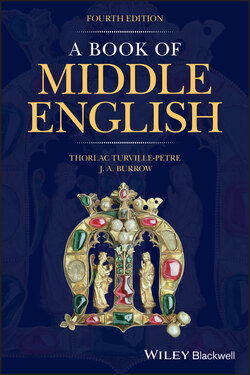Читать книгу A Book of Middle English - J. A. Burrow - Страница 63
5.4.5 Reflexive Pronouns
ОглавлениеThere is no distinctive reflexive pronoun in Middle English. The ordinary personal pronoun is used: ʒif ich me loki, ‘if I guard myself ’, 2/56; þe byschop hym shope, ‘the bishop got (himself ) ready’, 11/129. There is reciprocal use in we custe us, ‘we kissed one another’, 14j/46. The pronoun may be reinforced by the addition of self: if any so hardy … holdez hymselven, ‘if anyone thinks himself so brave’, 9/285.
Some verbs expressing fear, anger and the like, and many verbs of motion, are accompanied by a reflexive pronoun: thenne gan Wastor to wrath hym, ‘then Waster began to get angry’, 7b/149; he gooth hym, 18a/208. Even the verb ‘be’ may occasionally take a reflexive pronoun in Laʒamon: þene him wes Arður, ‘than Arthur was’, 3/29. On verbs of motion see 5.6.9.
